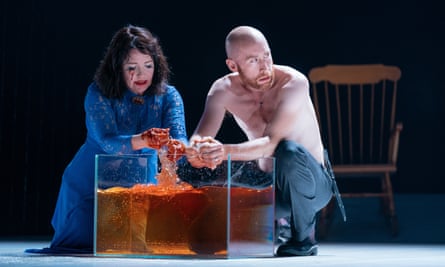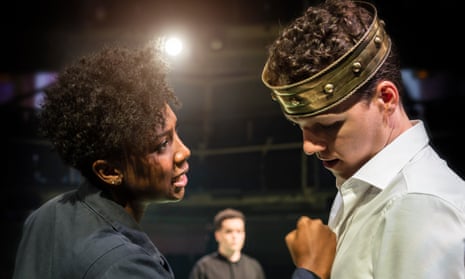Female writers and directors, impatient with male-dominated Shakespeare, are offering us fresh perspectives. In Manchester you can currently see Queen Margaret (★★★☆☆), which is Jeanie O’Hare’s presentation of the Wars of the Roses from Margaret of Anjou’s viewpoint, and othellomacbeth (★★★★☆), Jude Christian’s radical take on two of Shakespeare’s great tragedies. Even if the results are mixed, the productions offer plenty to chew on and are part of an inevitable historical process.
O’Hare’s method is to take the events of the Henry VI trilogy and, blending Shakespeare’s language with her own pastiche pentameters, put Margaret centre stage. Arriving in England from France as the bartered bride of the young, weak, holy Henry VI, she finds herself turning from despised outsider into an active power broker and militant warrior, as the realm dissolves into chaos. Jade Anouka plays her with wit, resource and energy, making the point that Margaret becomes profoundly English only to discover that her adopted country has – in a possible nod towards Brexit – “made a shameful conquest of itself”.
There are two problems, however, with O’Hare’s approach. By showing Margaret in constant dialogue with Joan of Arc, who oddly wants both revenge on her tormentors and the divinity of the throne protected, O’Hare dilutes the agency of her central character. Telescoping the events of a trilogy into a three-hour evening also produces, by the time we get to the battles of Towton and Tewkesbury, a sense of exhaustion.
Elizabeth Freestone directs with clarity and there is good work from Helena Lymbery as a choric commentator and Lorraine Bruce as a throne-hungry York, but I ended up feeling that I had not learned enough new about Margaret’s embattled isolation and that the action needed more room to breathe.

Compression is also at the heart of Jude Christian’s othellomacbeth, which offers us 70-minute versions of each play and which shows women turned from victims into instruments of revenge. I didn’t care much for Othello, which is played in front of a sheet-metal curtain and which, by drastically curtailing Iago’s role, turns the hero into a crazed wife-abuser. It does, however, yield one magical moment at the end when Desdemona (an exceptionally spirited Kirsten Foster), Emilia and Bianca join forces in singing a variation of Anjana Vasan’s Oh Sister and transmogrifying into the Witches in Macbeth.
What follows is one of the clearest, most compelling versions of the play I have seen in a long while. Played in a black box with a single, Godot-like tree in the background, it keeps the Witches on stage throughout: there are even links with the previous play, as when Foster seizes a handkerchief from the bloodied hand of Ery Nzaramba’s Banquo who earlier was Othello. The astonishing thing is that Sandy Grierson as Macbeth still has licence to explore the character’s descent from ambitious thane into murderous tyrant: at the same time we are never allowed to lose sight of Caroline Faber’s Lady Macbeth who, even when marginalised by her husband, sits nursing an empty shawl.
Christian captures the play’s propulsive action but her boldest idea is to suggest that the Witches – Foster, Kezrena James and Melissa Johns – are not just subconscious stimuli but permanent embodiments of women’s grief, rage and capacity for power. A familiar text is visibly refreshed by being seen from a feminist angle.

Comments (…)
Sign in or create your Guardian account to join the discussion